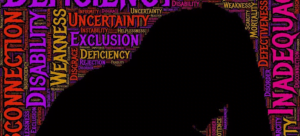Do you ever feel like no one understands you? Do you find yourself longing for the comfort of companionship, yet shying away from social interaction? You’re not alone. In this blog post, we’ll explore solitude and loneliness. What they are, why they happen, and how to make peace with them in order to live a more fulfilling life.
What is Solitude?
Solitude can be a powerful and transformative experience. It allows us to take a break from the hustle and bustle of everyday life. To step away from external distractions and reconnect with our inner selves. It can be used as an opportunity for self-reflection, introspection, and personal exploration. Solitude provides insights into who we are and how we can better understand ourselves. Through solitude, we can uncover greater levels of creativity and personal growth. Intentionally finding yourself in seclusion or isolation is a great way to gain perspective and learn more about yourself.
What is Loneliness?
Loneliness can be a deeply distressing emotion, often characterized by feelings of isolation and disconnection from the world around us. It is an experience that arises when we feel there is a discrepancy between the quality and quantity of social relationships we have compared to what we desire. Such feelings can be experienced even when surrounded by people, emphasizing the subjective nature of loneliness. When feelings of loneliness persist, they can lead to sadness, emptiness, and a sense of not being understood or valued by others.
Solitude vs Loneliness
Exploring the difference between solitude and loneliness is crucial for several reasons:
1. Mental Well-Being
Being alone can be a great opportunity for self-reflection and creative growth. But it’s essential to recognize the difference between solitude and loneliness. When we embrace our solitude with the right attitude, it can become a powerful source of renewal and personal discovery. It allows us to gain clarity over our emotions and strengthen our mental resilience. On the other hand, failing to recognize loneliness and its impact can lead to prolonged negative emotions. It can damage your mental health and potentially contribute to depression or anxiety. With an understanding of the difference between these two experiences, you can learn how to better manage your mental well-being.
2. Self-Awareness
By understanding the differences between feelings of solitude and loneliness, individuals can increase their self-knowledge and awareness. When in solitude, individuals are able to engage in healthy self-reflection and reflection on life’s experiences without external distractions. In contrast, loneliness is often caused by the unfulfilled need for meaningful human relationships. Through recognizing the contrast between these two states, individuals can make conscious decisions about their social life and emotional well-being.
3. Social Connections
We need to learn the nuances between solitude and loneliness. This can help us find a better equilibrium between our need for personal time and time spent with others. This can also foster more meaningful relationships. Solitude is essential for self-reflection, growth, and renewal. Allowing loneliness to become prolonged can cause serious mental health issues such as depression and anxiety. We need to recognize when to seek solitude and when to reach out. This is so that we can create a balance between alone time and socializing that leads to healthier relationships. .
4. Personal Growth
Exploring moments of solitude can be a profound and valuable experience. It can help us understand ourselves better and bring forth our inner creativity. Taking time to reflect on life experiences, brainstorm ideas, or simply enjoy peace and quiet are just some ways to make the most of solitude. On the other hand, we need to recognize that loneliness is a part of life. Understanding how to address it can help us build stronger support networks and cope with emotional distress. By embracing solitude positively, we can learn more about ourselves and discover new paths of personal growth and development.
5. Emotional Resilience
Knowing the difference between solitude and loneliness is essential for cultivating emotional resilience. Solitude can be liberating and loneliness can be difficult. To be able to see that helps us to manage life’s twists and turns more effectively. By recognizing the distinction between beneficial moments of being alone and malignant isolation, we are better equipped to tackle these situations head on. Take the time to understand the difference between solitude and loneliness. This can help us create a stronger emotional foundation for facing life’s uncertainties.
6. Quality of Life
By exploring the nuanced difference between loneliness and solitude, individuals can benefit greatly in terms of their overall quality of life. Learn to accept being alone without feeling isolated or scared of being judged for feeling lonely. Only then can we begin to lead a balanced, more meaningful, and enjoyable existence. Taking the time to recognize and understand the difference between loneliness and solitude can be an incredibly powerful tool to achieving a greater level of happiness.
The Influence of Technology on Solitude and Loneliness
Technology has had an immense impact on loneliness and solitude. It profoundly influences how people perceive and live with being alone and connecting with others. For some, it is a positive shift that has opened up new possibilities for communication digitally or virtually. Whereas for others, it can be detrimental to mental health due to feelings of isolation or lack of human contact. No matter the experience, technology has undeniably changed the way we interact and manage our lives when alone.
Increased Connectivity
Technology, particularly modern social media and messaging applications, has enabled us to keep in touch with our loved ones from the comfort of our own homes. This heightened connectivity helps to alleviate loneliness and feelings of isolation. However, it can also be tricky to determine when we should take time for ourselves and enjoy a moment of peaceful solitude. Finding the balance between social interaction and personal time can be a challenge. With a few small changes, though, it’s possible to make sure you get enough quality alone time.
Social Media and Loneliness
Social media has been linked to a surge in loneliness and social disconnection. Seeing other people’s seemingly perfect lives on platforms like Instagram can lead to feelings of inferiority and comparison, thus exacerbating one’s own isolation. While social media offers the potential for connection, it can also have a damaging effect when used too excessively.
FOMO (Fear of Missing Out)
The fear of missing out (FOMO) has been exacerbated by technology and social media. When people observe their peers engaging in fun activities or attending exciting events posted on the internet, it can invoke disheartening emotions of loneliness and feeling left out. This can happen even if the person is consciously deciding to stay away. This can be a challenging struggle to overcome.
Digital Disconnection
Excessive technology usage can lead to a breakdown in meaningful human connection. With more and more interactions happening over screens, people are losing the opportunity to build relationships with deep understanding and empathy. As reliance on devices increases, there is a risk of losing out on the benefits of face-to-face communication, such as reading body language and picking up on subtle nuances. It is important to remember to unplug and reconnect with the real world in order to foster meaningful relationships.
Online Communities
Technology has opened up a world of possibilities for people to come together in online social networks and virtual support systems. This has been hugely beneficial to those with highly specific interests or needs, enabling them to find like-minded individuals in far flung places. However, it can also lead to an overreliance on virtual connections, leaving individuals feeling more isolated and alone than ever before.
Internet Addiction
The overreliance on technology and the internet can quickly spiral into addiction, bringing about serious repercussions such as social isolation, an erosion of real-world relationships, and a greater sense of loneliness. Prolonged and unchecked engagement with digital activities can lead to an unhealthy detachment from reality, leading to a disruption in natural routines and an overall decline in mental health.
Impaired Communication Skills
The overreliance on digital communication can have a detrimental effect on someone’s ability to build meaningful relationships in person, as it might prevent them from developing the important interpersonal skills necessary for human connection. The lack of practice engaging with people face-to-face can leave individuals feeling unable to effectively navigate social situations and struggle to form lasting bonds.
Digital Detox
The increasing presence of technology has had a profound effect on our individual feelings of solitude and loneliness. In response, individuals are taking steps to break away from the screens that surround us and invest in meaningful relationships, activities, and experiences that can satisfy our innate need for genuine solitude. By accepting digital detox challenges and engaging in activities that can help us reconnect with ourselves and our environment, we are becoming more conscious about how we use technology in our lives. This shift is us building a healthier relationship with technology while also allowing us to foster meaningful relationships and experiences that provide true solace.
Strategies for Disconnecting to Reconnect with Oneself
You can have a great experience by taking some time away from technology and reconnecting with yourself. It can help you with mindfulness, thinking about yourself, and growing as a person. Finding the right balance between using technology and disconnecting is different for everyone. Try these tips to see what works best for you to get back in touch with yourself and have a better relationship with tech.
Set Boundaries
Set limits on how much time you use technology each day. Create “tech-free” zones or hours, like when you eat or before you go to bed. That way, you can have some time without technology and think about things by yourself.
Unplug Devices
Turn off notifications on your devices, or put them on silent mode. Use an alarm clock instead of your phone to avoid extra time looking at a screen.
Digital Detox Days
Take regular breaks from technology. Use these breaks to do activities that will help you relax, like reading, writing in a journal, or spending time outdoors. This will help you be more mindful and get to know yourself better.
Practice Mindful Awareness
Be aware of why you are using technology. Don’t get lost in mindlessly scrolling through social media and focus on using technology for specific purposes or tasks.
Establish Tech-Free Rituals
Create daily rituals that don’t involve technology, like meditating in the morning, taking an evening stroll or doing some mindful breathing exercises. These can help you stay connected to yourself without any distractions.
Cultivate Hobbies and Interests
Try out fun activities that do not involve technology, like painting, gardening, playing a musical instrument, or cooking. These things will help you express yourself and relax.
Connect with Nature
Reconnect with yourself and nature by spending time outdoors. Go for a hike, camp out, or just take a stroll in the park. These activities can help you to feel refreshed and connected again.
Prioritize Real-Life Connections
Nurture your relationships with friends and family. Plan activities or get-togethers that help you have meaningful conversations and make strong connections.
Closing Thoughts
Exploring solitude and loneliness can help you understand the effects they have on your life. If you embrace solitude with intention and mindfulness, it can become a place to grow, discover yourself, and be creative. Diving deep into your thoughts and feelings will give you a better understanding of yourself. Loneliness shows us how important it is to connect with others. It encourages us to form meaningful relationships with people around us, teaching us empathy, compassion, and belonging. Being vulnerable helps build stronger connections with other people in our lives which brings love and shared experiences.
It’s important to understand that you can have both moments of time alone and meaningful relationships with others. These two things don’t have to be one or the other, but instead work together in harmony for your emotional health. In our always-connected world, it can be hard to find this balance between solitude and social connection. Technology and virtual connections can make it difficult for us to remember how great real moments of solitude are and how strong genuine relationships are. So, let’s take a step back from technology every now and then, enjoy the present moment, and appreciate real connections with people around us.
As we explore our life’s journey, let’s remember to appreciate both our alone time and the relationships we have with others. Doing this allows us to value our uniqueness while cherishing the connections that make up humanity. When solitude and social connection are balanced in harmony, they become the basis for a more meaningful and rewarding life.
























